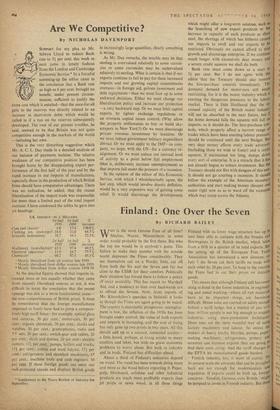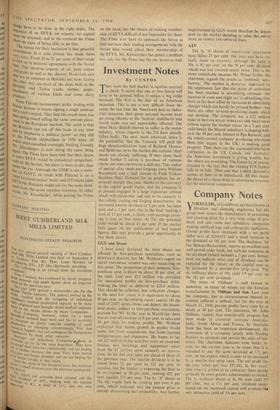Finland: One Over the Seven
By RICHARD BAILEY
WHO is the most famous Finn of all time? Sibelius, Nurmi, Mannerheim in some order would probably be the first three. But who the top ten would be is anybody's guess. This failure to make their number with the outside world depresses the Finns considerably. They see themselves out on a Nordic limb, cut off from both the Six and the Seven and far too clOse to the USSR for their comfort. Politically their situation has forced them to follow a policy of strict neutrality. This has meant no Marshall Aid, and a tendency to lean over backwards not to offend the Soviets. Now, from reports of Mr. Khrushchev's speeches in Helsinki it looks as though the Finns are again going to be tested. The country is reasonably prosperous; unemploy- ment is low, the inflation of the 1950s has been brought under control, the value of both exports and imports is increasing, and the cost of living has only gone up two points in two years. All this should add up to a relaxed, contented society— a little bored, perhaps, at living amidst so many conifers and lakes, but with no grave economic problems to worry about. But both in industry and in trade. Finland has difficulties ahead.
About a third of Finland's industries depend on wood. The trend has been towards doing more and more to the wood before exporting it. Paper, pulp, fibreboard, cellulose and other industrial products are much more profitable exports than pit props or sawn wood; in all these things Finland with its lower wage structure has Of now been able to compete with the Swedes Norwegians in the British market, which ta from a fifth to a quarter of its total exports. the. setting up of the European Free Tr Association has introduced a new element; July 1 the Seven cut their tariffs on trade each other by 20,per cent. To keep in the runt the Finns had to cut their prices on dtitit goods.
This means that although Finland still has so Ile' thing in hand in the forest industries, in engineer' ing and metal working—where all raw materials have to be imported—things, are becom ing difficult. Home sales are carried on safely enough behind a tariff hedge, but a market of just over four million people is not big enough to emplOY industries using mass-production techniques. Short runs are the most wasteful way of in Ulf; factory machinery and labour. So unless the makers of heavy trucks, bicycles, pumps, pal making machinery, refrigerators, pottery nd ceramics can increase exports they are going find their costs rising. And the tariff chargesirl the EFTA hit manufactured goods hardest.
Finnish industry, too, is short of capital. its present scale the amounts that can be ploug back are not enough for modernisation expansion. If exports could be built up, fort concerns--Swedish. German, even British In be tempted to invest in Finnish industry. But ti
to pd keS
things have to be done in the right order. The sequence of no EFTA, no exports, no capital must be reversed; and at the moment the Finns show no signs of being able to do this. The reason for their hesitation is that peaceful ce-existence in a cold climate has made them verY wary. From 10 to 15 per cent of their trade Lis tied up in bilateral agreements with the Soviet "loc. This involves imports of oil,. steel, cotton and grain, as well as the chromy Moskvitch cars that are so common in Helsinki just now. Going the other way are most of the ships built at the Helsinki and Turku yards, timber, paper, machinery of various kinds and some dairy
Produce.
Some Finnish businessmen prefer trading with Russia because it means signing a single contract for a Year's output. They find this much more fun than going round selling the same amount piece- meal in the European markets. The catch is that the Russians can cut off this trade at any time just to emphasise a political point—as they did to theFinnish shipbuilders in 1958 when all Orders were cancelled overnight. Smiling, friendly Mr. Khrushchev is now doing the same thing gain-The Finns have been told that their desire 1° enter EFTA would be considered sympatheti- cally by the Soviets; but there is more in this than Meets the eye. Although the USSR is not a mem- be, 1. of GATT, its trade with Finland is on a Lllost favoured nation' basis; and if Finland joins FTA the Russians might ask for the same treat- ilient from the seven member countries. In other Words Mr. Khrushchev, while patting the Finns
on the head, has the means of making member- ship of EFTA difficult if not impossible for them. The Finns now have to approach the Seven to find out how their trading arrangements with the Soviet bloc would affect their membership of the EFTA. Mr. Khrushchev has posed a problem not only for the Finns but for the Seven as well.



































 Previous page
Previous page